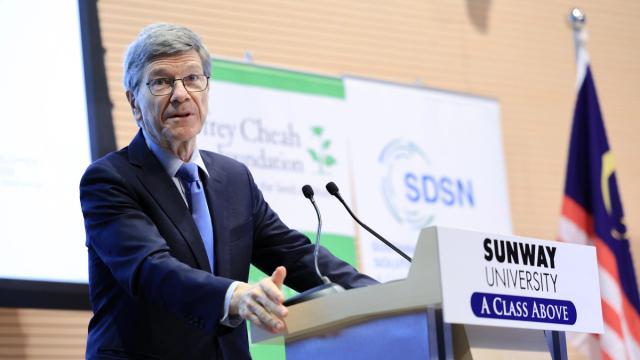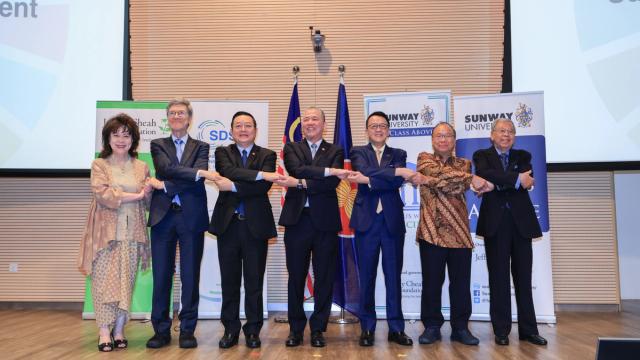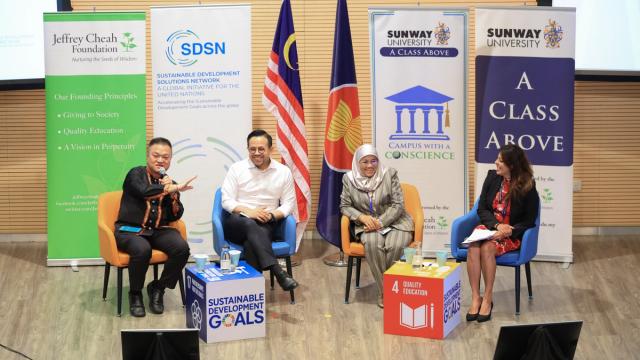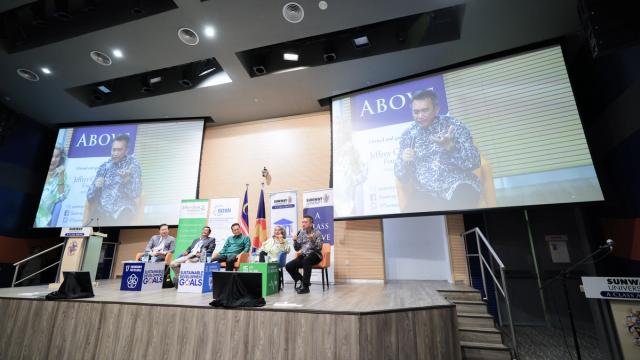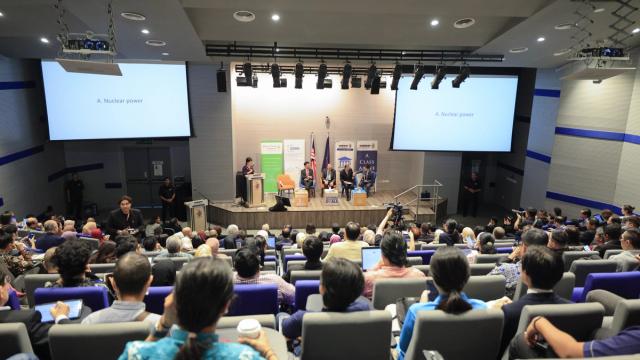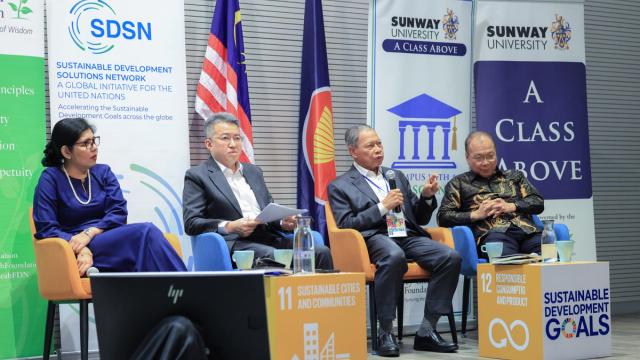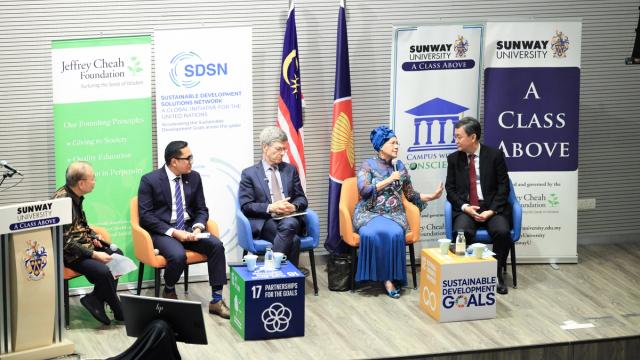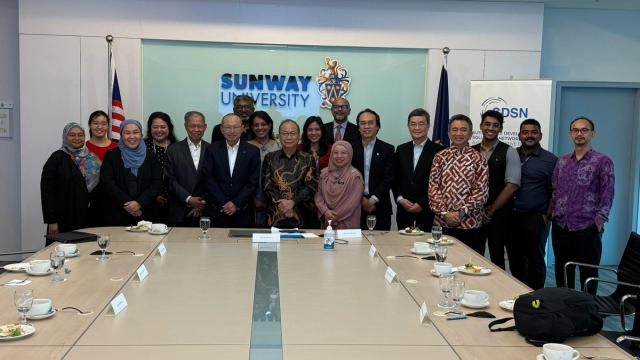SDSN Advances Southeast Asia’s Energy, Economic, and Environmental Future at the 2025 ASEAN Workshop on Sustainable Development
On January 13 and 14, 2025, the UN Sustainable Development Solutions Network (SDSN) began the new year by hosting the 2025 ASEAN Workshop on Sustainable Development (AWSD) at Sunway University in Kuala Lumpur. With Malaysia assuming the chairmanship of ASEAN, the event provided an important and timely opportunity to advance the discourse on Southeast Asia’s development and its critical next steps toward achieving the Sustainable Development Goals (SDGs) by 2030.
Featuring an esteemed lineup of ministers, experts, and other dignitaries from Malaysia and beyond, the Workshop fostered and strengthened partnerships across Southeast Asia. It also showcased the SDSN’s existing efforts to drive action on biodiversity conservation, the energy transition, and other sustainability priorities in the region.
Presentation: Recent Global Developments and Their Implications for Sustainable Development
The SDSN President, Prof. Jeffrey Sachs, opened the AWSD with a special presentation on recent global developments and their implications for sustainable development. Sachs identified three destabilizations currently facing humanity:
- Geophysical destabilization without political solutions
- Unpredictable technological advances
- A geopolitical phase that will see the rise of Asia and the decline of the West
In this increasingly complex world, he stressed regional integration is key. “ASEAN was a nice and convenient idea in the past. Now, it is the essential idea.” Prof. Sachs called for more education and research, financing, and unity across ASEAN to drive the agenda forward.
Opening Ceremony: ASEAN 2025 and the Quest for Sustainable Development
The official opening of the Workshop was introduced by Prof. WOO Wing Thye, the SDSN’s Vice President for Asia, who highlighted the progress of the Kuala Lumpur office’s four major projects:
- The ASEAN Green Future project, in which nine country teams are working in tandem to identify decarbonization strategies individually and collectively
- “Leaping over the Middle Income Trap,” a project aimed at advancing economic development in regional middle-income countries
- Education and training for sustainable development via the SDG Academy and Mission 4.7
- The Science Panel for Borneo, which brings together experts from across the island to make recommendations on how to best protect this crucial biodiverse region
Tan Sri Dato’ Seri Sir Dr. Jeffrey Cheah, Founder and Chairman of Sunway Group and Chair of SDSN Malaysia, also provided welcoming remarks and shared how Sunway supports the SDGs domestically and regionally. Prof. Sachs then returned, emphasizing the strategic importance of ASEAN for advancing sustainable development in the region.
Next, H.E. Dr. KAO Kim Hourn, Secretary-General of ASEAN, noted the recent achievements of ASEAN in strengthening cooperation around education, environmental protection, renewable energy, and more. He outlined six ways ASEAN can advance its work in the context of the ASEAN Community Vision 2045:
- Strengthen ASEAN’s global sustainability leadership
- Leverage sustainable finance to drive the transition towards a circular economy
- Ensure inclusive use of digital services for improved economic and governance outcomes
- Promote public-private partnerships to invest in human capital development, particularly for women and girls
- Empower youth with green skills
- Foster international partnerships and enhance cooperation across the region
Dr. Kao also invited closer collaboration with the SDSN to pursue solutions for achieving the SDGs, stating, “Your global network and vast repository of knowledge will be truly invaluable in our journey towards sustainability.”
Finally, Dato’ Sri Haji Fadillah bin Haji Yusof, Deputy Prime Minister of Malaysia, representing Prime Minister Anwar Ibrahim, highlighted the priorities of Malaysia’s ASEAN Chairmanship for 2025, namely energy decarbonization, biodiversity protection, and enhancing economic connectivity across the region. “Let us move forward together, not only as a community of nations, but as stewards of a better future for all.”
Panel One: Operationalizing the Malaysia MADANI Education and Training Agenda
Moderated by Prof. WONG Chin Huat, the SDSN’s Director of Institutional Design, panelists discussed the demands of workforce development for a prosperous economy. Malaysia’s Minister of Human Resources, Mr. Steven Sim, unpacked the dynamics of the education and training landscape that impact the country’s present and future human capital. Prof. Madya Dr. Wan Zuhainis binti Saad, Director of the Centre for Academic Development and Leadership Excellence at Universiti Putra Malaysia, stressed that education — especially higher education — must strike a balance between developing skills for the job market and providing intellectual fulfillment.
Finally, the SDSN’s Director of Education Studies, Ms. Karen Chand, presented the Mission 4.7 Malaysia initiative and discussed the opportunities and challenges of transforming national education systems to build a resilient society capable of navigating the complexities of the 21st century. “We need problem solvers to create a value chain in education across all public schools and to produce thinkers.”
Panel Two: Responsible Environmental Stewardship: Science Panel of Southeast Asia and COP30
The first day concluded with a panel on responsible environmental stewardship moderated by Dr. CHEN Jit Ern, Associate Professor and Head of the Jeffrey Sachs Center on Sustainable Development at Sunway University. Mr. Nik Nazmi bin Nik Ahmad, Malaysia’s Minister of Natural Resources and Environmental Sustainability, highlighted how ASEAN, one of the most biodiverse regions in the world, must preserve its vulnerable natural heritage.
Panelists — including Prof. Jatna Supriatna, Chair of the Research Centre for Climate Change at the University of Indonesia and Chair of SDSN Indonesia; Prof. Emeritus Dato’ Dr. Mazlin Mokhtar, SDSN’s Director of Ecological Studies; and Ms. Emma Torres, the SDSN’s Vice President for the Americas — presented the Science Panel for Borneo, which was launched at COP29 in Baku, Azerbaijan. The Science Panel for Borneo, the first phase of a larger Science Panel for Southeast Asia, joins the Science Panel for the Amazon and the Science Panel for the Congo Basin in leading the global conversation on ecosystem conservation. The Panel will present its inaugural Assessment Report at the Climate COP30 in Belem, Brazil, in November 2025.
Panel Three: Powering ASEAN Green Future: Power Generation, Transmission, and Storage
The second day of AWSD 2025 opened with a panel discussion on the synergistic and competitive interplay between three transformative forces: the resurgence of nuclear power, expanding power interconnections, and pumped hydro storage.
Deputy Prime Minister Dato’ Sri Haji Fadillah, who is also Malaysia’s Minister of Energy Transition and Water Transformation, returned to discuss Malaysia’s net zero ambitions and strategies to meet these goals, such as clean energy generation, energy storage solutions, and the adoption of more electric vehicles. Mr. XIN Baoan, Chairman of the Global Energy Interconnection Development and Cooperation Organization (GEIDCO) and President of the China Electricity Council (CEC), discussed China’s rapid development of energy solutions and how lessons from China can support similar efforts across ASEAN.
Finally, Mr. Keiju Mitsuhashi, Director (Southeast Asia and the Pacific) of the Energy Sector at the Asian Development Bank (ADB), discussed the Bank’s financing priorities in the region and how it supports Member States in developing their energy plans. The session was moderated by Prof. LEONG Yuen Yoong, Director of Ecological Systems at SDSN, who also presented the progress of the ASEAN Green Future project.
Panel Four: Transformative Economic Management for Malaysia MADANI in a Politically Fractious World Threatened by Environmental Crises
Despite regional and global challenges, the economies of ASEAN are growing. In this panel, Malaysia’s Deputy Minister of Investment, Trade and Industry, Mr. LIEW Chin Tong; Dato’ Seri Mustapa Muhamed, a Distinguished Fellow with the SDSN’s Economic Studies program; and Prof. Woo, discussed present and future opportunities for Malaysia and its ASEAN neighbors to leverage and collaborate around inclusive economic policies, innovative financing mechanisms, and the development of a sustainable economy.
Panel Five: Moving the SDG Agenda Forward in ASEAN
The final session, moderated by Prof. Woo, featured Dr. Ahmad Zafarullah Abdul Jalil, Director of the ASEAN Integration Monitoring Directorate, speaking on behalf of the Secretary-General; Prof. Emerita Tan Sri Dato' Seri Dr. Sharifah Hapsah Syed Hasan Shahabudin, President of the National Council of Women’s Organizations; Mr. ONG Pang Yen, Sunway Group's Executive Director in the Chairman's office, representing Tan Sri Dato’ Seri Sir Dr. Jeffrey Cheah; and Prof. Sachs. They discussed the next steps to urgently address the issues and solutions presented throughout the Workshop, leveraging the appropriate resources and enablers.
Prof. Sachs ended the session by invoking the lessons of both Western and Eastern ethical traditions, calling for them to be updated to promote harmony and cooperation in the 21st century. Quoting U.S. President John F. Kennedy, he said, “For, in the final analysis, our most basic common link is that we all inhabit this small planet. We all breathe the same air. We all cherish our children's future. And we are all mortal.”
At this important juncture for the region and the world, the 2025 ASEAN Workshop on Sustainable Development succeeded in ushering in Malaysia’s Chairmanship and kickstarting crucial conversations on regional cooperation.
You can watch recordings of both days on the SDSN YouTube channel.
Photos by Kerwin Chik Studio.
Meeting of SDSN Malaysia’s Leadership Council Members
On the sidelines of AWSD, members of SDSN Malaysia’s Leadership Council convened to discuss strategic opportunities for the network going forward. Also present were SDSN Malaysia co-Network Managers Ms. Karen Chand and Ms. KONG Phui Yi; Networks Program Secretariat staff Ms. Amirah Majid, Mr. Gautham Varada Narayan, and Mr. Kannan Nair; and representatives from Sunway Group and the National SDG Centre.
For more information, visit the SDSN Malaysia website.
